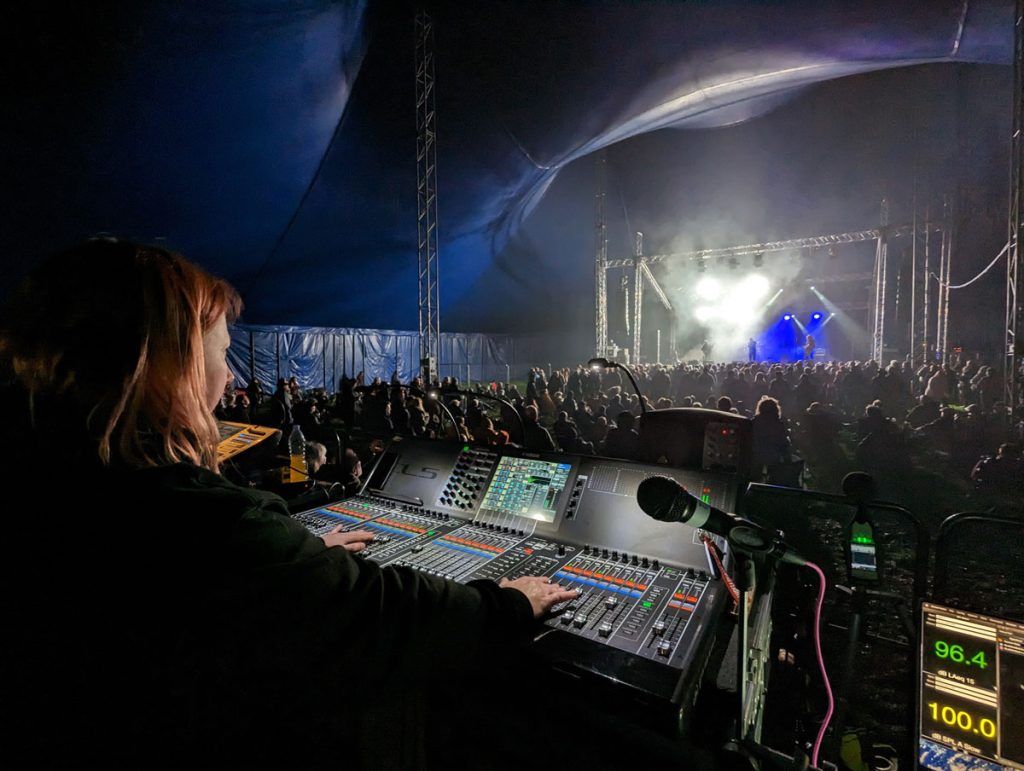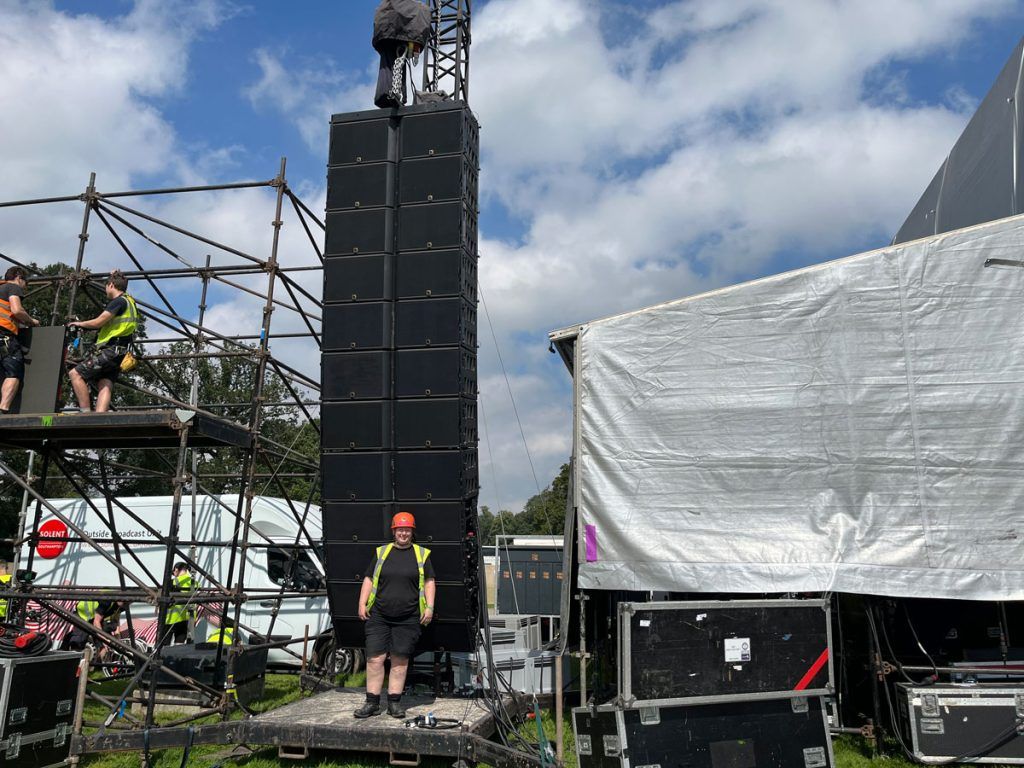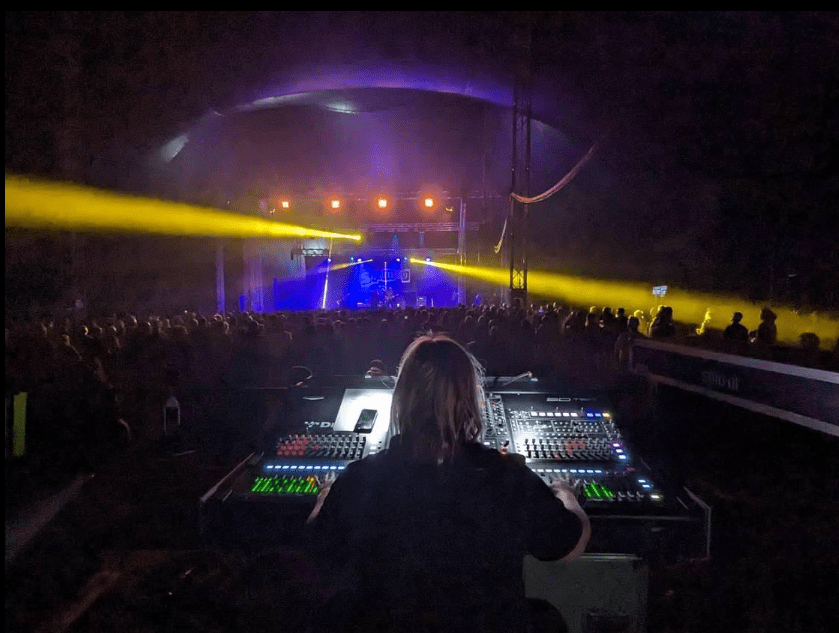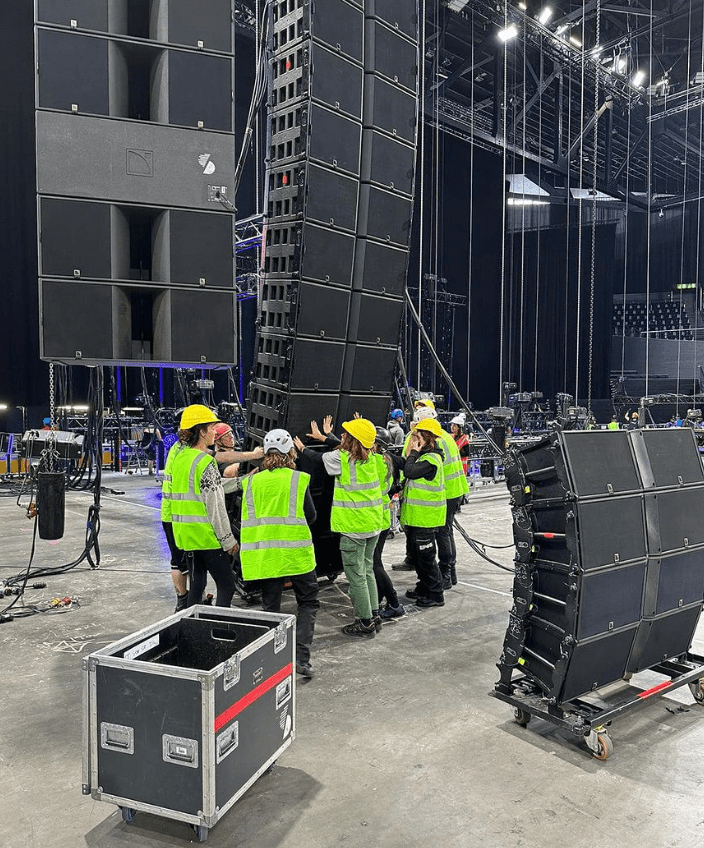Women in Pro Audio: Kim Watson Women in Pro Audio: Kim Watson...
“You are also not alone. There are women worldwide doing this. We are stronger together. Team up with the other women around you to create a support network and get to know the other women engineers around you.” – Kim Watson
For our Women in Pro Audio series this month, we met Kim Watson, a recent SoundGirls and L-Acoustics grant recipient and a freelance live sound engineer and audio educator. “I do a bit of everything: PA system design, system tech, FOH engineering, and monitor engineering. More recently, I’ve also become an instructor for Rational Acoustics.”
Meet Kim
Kim always knew the music industry was her calling. Even from a young age, she would play around with recording audio to tape with a microphone. “The technology interested me. I always knew I wanted to be a sound engineer. Back in school, I was always found hiding out in the music block playing with the studio.”
But when Kim visited a career adviser at school, she was told it was not a real job. “I think that attitude has greatly changed in the last 20 years. This is a viable career now. I attended an HND Music Production course here in Newcastle to do music technology and was one of only a couple of girls in my class. But I loved it and still felt this would be my long-term career. During the course, I asked a local PA company that looks after a 1000-capacity venue if I could come along and be a stage tech to get experience. And they said yes! From there, I moved up to mixing monitors, working directly for venues and the production company. Gradually making contacts and expanding my network.”
The house engineer at Newcastle O2 Academy for 16 years before it closed in 2022, Kim’s current client list includes production companies Solotech, Stage Audio Services, ESS, and Alrose Productions. “Throughout my career, I have worked with diverse clients, from local bands to international superstars, and have developed a reputation for excellence in the industry. I have committed to staying up-to-date with the latest technologies and techniques; I pride myself on delivering top-quality sound every time.”

Challenges
As far as industry challenges for women go, Kim feels she was lucky. “The crew guys I was working alongside were very supportive of me, showing me how to lift cases safely and dealing with anyone who was a problem on a gig. They looked after me. Later on, the biggest challenge I faced was being ‘glass-ceilinged’ (is that even a term?). I was told I was too good on monitors and, at the stage end, to be allowed to be a FOH engineer and system tech. Yet, I watched countless other engineers on FOH. Some couldn’t fly or align the PA. But I wasn’t allowed, not necessarily because I was female, but more likely because I was just too good at the other end. And instead of using the fact that there are very few female system techs out there as an advantage, I was held back.”
Another challenge, Kim points out, is an issue she’s noticed is happening in the industry right now: “We have a massive shortage of engineers in the lower to the middle of the industry at the moment. There is a massive gap in the workforce. After the height of the COVID-19 pandemic, many old guards moved on or retired, and all the middle engineers moved up, including me. This left a gap. Meanwhile, the young ones who would have learned from the skilled engineers that information is being missed again must learn everything from scratch. I want to help bridge that gap. By educating them both with system measurement and some of the backstage skills. Maybe we can run a yearly class before the festival season and bring them in to work on some bigger shows.”
Changes
Kim has seen a slow shift with the industry becoming more inclusive over the past few decades. As she looks back, those changes seem more dramatic today than twenty years ago. “I’ve seen a massive change in the industry in the last twenty years. There were only two other local female engineers when I started out. Now there is a whole group of them! It’s fantastic. I think the industry has always had a masculine reputation to it. The job still takes a certain type of person to do it. It’s hard work. You work long hours, which must be your life’s passion. It’s not just a job! I also think being more visible online and active in the audio community will help new engineers come into the industry. I was initially resistant to it because I wanted to be known as a good engineer, not just a good female engineer. But the further I got in the industry, the more I realized how important that representation is. The saying goes, if you can see it, you can be it. I hope that being visible inspires people to go for it!”
She adds, “You are also not alone. There are women worldwide doing this. We are stronger together. Team up with the other women around you to create a support network and get to know the other women engineers around you.”
Industry Tips & Advice
ProSoundweb, Live Sound International Mag, and the Signal to Noise podcast are Kim’s favorite sound engineering resources. “There is a wealth of information in those pages. Also, SoundGirls has had a tremendous influence on my career. There were never many women around when I started 23 years ago, and it is fantastic to see the growth of women in this industry. I’ve worked alongside some amazing, talented women in the last few years. I also completed my Level 2 L-Acoustics classes earlier this year, thanks to the SoundGirls and L-Acoustics grants! I really enjoyed the classes. So, a huge thanks to L-Acoustics for supporting women in this industry!”
New engineers should always do the research and be open to learning more, Kim says. “It’s important to have as much knowledge as possible. I constantly attend training courses and do audio research. If I have that information before a problem arises, I can solve it better. The best advice I ever received would be from a business adviser when I started out. He asked me, ‘What do you define as success?’ Back then, I had no idea what he meant. I just assumed being successful meant making loads of money. The more we talked, the more I realized that success meant being in a job I enjoyed, was good at, and was respected by those around me.”

Necessary Skills
The top three skills Kim recommends focusing on are soldering and being able to fix things on-site, “This can rescue a show!” and then second, computer networking. “This has become such a huge part of our job. Knowing the basics can again save a show.” Then, with the third skill, Kim says, “In the same vein as soldering, fault finding is a HUGE skill to learn. If there is an issue and you can fix it fast, without panicking, you are the hero of the day!
Giving Up
A common phrase and shared sentiment is that the live event industry isn’t for everyone. And at least everyone has had a moment during their careers where they’ve felt like leaving it all and starting over. Kim shares a time when she came very close to quitting. “It was three years ago. I was ready to walk away from it all. I have two photos of myself about three months apart. In the first photo, you can see how broken I was. I made a massive career change at that point, and in the photo three months later, I was happy to the core. A totally different person.”
Kim continues, “If I can offer advice to anyone, it would be that if you’re working somewhere and feeling broken at the end of work and not enjoying your job, don’t be afraid of walking away. Your mental health is way more important, and you can find a place that makes your heart sing.”
Kim further expands on that advice: “As soon as you publicly state the direction you want to go, people will start offering you that work. If you don’t tell people, they will never know.”
Why She Does It
Travel and its cumbersome logistics can get hectic while working gigs. Kim shares an anecdote where she was worried the plane would take off without her. “We had a tight transfer at Moscow Airport. We had a small flight coming in and had to run out, re-do customs, and get to the flight. Security stopped me as I went through, and they ended up conducting a full bag search. Everyone else went through it. Then there’s Just me alone in the Moscow airport. I could hear the final calls being made. I had to run the full length of the airport down three floors to get to the check-in gate. The gate was closed when I arrived, but the band and crew refused to get on the plane until I got there. We all sat on the bus to the plane waiting for me! Legends!”
Once, during a load out on a job, the floor under the stage was a foot underwater, and Kim got drenched while pulling multicores because no one else wanted to. We then asked why Kim does the long hours, deals with such physical obstacles, and nearly misses her flights. “I love the tech, the physics, and even the physical work. Also, getting paid to travel the world and the awesome people I get to do it with is amazing. But most of all, I love watching the audience walk away as we de-rig, knowing they had an awesome night.”
The Best Parts
A highlight of it all: “I was a PA tech a few years ago for the band A-ha. I was working for Solotech alongside system tech Mark Pantlin. He was a total pleasure to work with, and I learned loads from him. I got a surprise tour with the artist Tom Grennan earlier this year. I got a call at 8 am asking if I could be at rehearsals yesterday! By 9:30, I was on a train to the production studio. It was a great tour with great people.”
And mostly, Kim is proud of how far she’s come. “I love to look back at the long road I have taken to get to where I am today—slow and steady progress over the years. When I felt ready, and an opportunity came along, I moved up. I have worked incredibly hard, but it was all so worth it.”
You can head to her website here to learn more about Kim Watson and check out her portfolio.


Subscribe to Our Newsletter
Get the lastest news and find out about listening events.